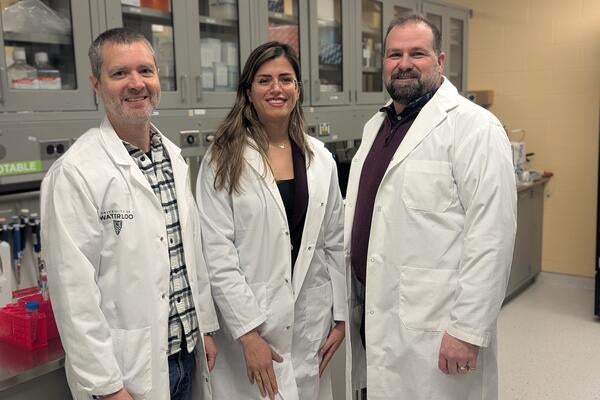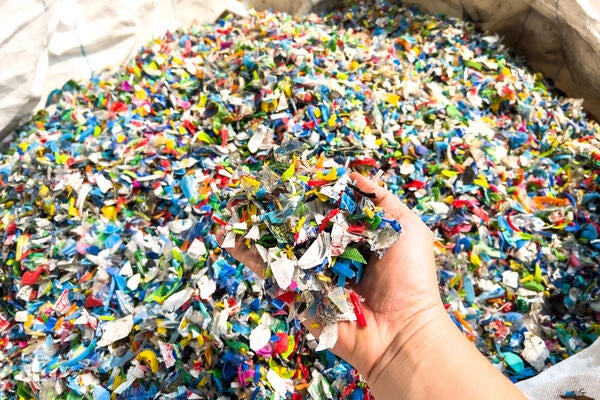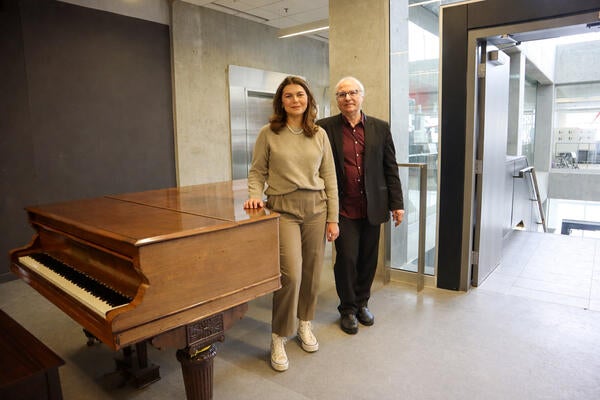
Detecting infection in under 30 minutes
Engineering professor wins federal funding to develop rapid, portable test for COVID-19

Engineering professor wins federal funding to develop rapid, portable test for COVID-19
By Brian Caldwell Faculty of EngineeringA researcher at Waterloo Engineering has won $265,000 in federal backing to develop a palm-sized device capable of detecting COVID-19 infection within 30 minutes.
Carolyn Ren, a professor of mechanical and mechatronics engineering, will lead the one-year project by a team that includes professors Emmanuel Ho of the School of Pharmacy at Waterloo and Keith Fowke of the University of Manitoba.
The project builds on Ren’s work on microfluidics and lab-on-a-chip technology to develop a portable, point-of-care instrument to rapidly diagnose COVID-19.

Carolyn Ren is a professor of mechanical and mechatronics engineering.
The device is expected to greatly expand testing and control spread of the virus through use at drive-through sites and other community locations.
“This tragedy could be prevented from happening or its impact could be largely minimized if rapid, massive-scale testing can be performed at the community level without the need of highly trained professionals and expensive equipment,” the researchers wrote in their proposal.
The project is one of 139 across the country announced today for federal funding through the Canadian Institutes of Health Research. Funding totals nearly $110 million.
The winners were selected from almost 1,500 applications after the Canadian government launched a second rapid research funding competition for work related to COVID-19 in April. That initiative followed $55 million in support announced for 100 projects in March.
“I congratulate the successful teams for their essential work aimed at better preventing, detecting and treating COVID-19 at the individual and population levels,” Health Minister Patty Hajdu said in a media release announcing the latest winners.
Ren’s project, Development of a Microwave Enabled Bio-Nano-Microfluidic Device for Point-of-Care Diagnosis of COVID-19, leverages the expertise of team members in engineering, nanotechnology, viral immunology and clinical medicine.
The instrument would consist of battery-powered microwave circuitry and a microwave-microfluidic device with a sensor surface modified by gold nanoparticles to recognize the COVID-19 virus.
A nasal swab from a patient would be stirred in a solution, a drop of which would then go into the device for detection of the virus. A yes or no result for infection would be indicated by a light.
Ellen Maceachen, a professor at the School of Public Health and Health Systems at the University of Waterloo, also made a successful bid to the competition.
Her team will receive almost $163,000 in funding for research on transmission risks and containment strategies for gig couriers delivering food and doing other work during the pandemic.

Read more
Researchers engineer bacteria capable of consuming tumours from the inside out

Hand holding small pieces of cut colourful plastic bottles, which Waterloo researchers are now able to convert into high-value products using sunlight. (RecycleMan/Getty Images)
Read more
Sunlight-powered process converts plastic waste into a valuable chemical without added emissions

University of Waterloo researchers Olga Ibragimova (left) and Dr. Chrystopher Nehaniv found that symmetry is the key to composing great melodies. (Amanda Brown/University of Waterloo)
Read more
University of Waterloo researchers uncover the hidden mathematical equations in musical melodies
Read
Engineering stories
Visit
Waterloo Engineering home
Contact
Waterloo Engineering
The University of Waterloo acknowledges that much of our work takes place on the traditional territory of the Neutral, Anishinaabeg, and Haudenosaunee peoples. Our main campus is situated on the Haldimand Tract, the land granted to the Six Nations that includes six miles on each side of the Grand River. Our active work toward reconciliation takes place across our campuses through research, learning, teaching, and community building, and is co-ordinated within the Office of Indigenous Relations.